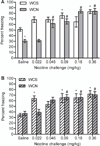Withdrawal from chronic nicotine and subsequent sensitivity to nicotine challenge on contextual learning
- PMID: 23660650
- PMCID: PMC3703252
- DOI: 10.1016/j.bbr.2013.04.053
Withdrawal from chronic nicotine and subsequent sensitivity to nicotine challenge on contextual learning
Abstract
Nicotine withdrawal is associated with numerous symptoms including impaired hippocampus-dependent learning. Theories of nicotine withdrawal suggest that nicotinic acetylcholine receptors (nAChRs) are hypersensitive during withdrawal, which suggests enhanced sensitivity to nicotine challenge. Research indicates that prior exposure to nicotine enhances sensitivity to nicotine challenge, but it is unclear if this is due to prior nicotine exposure or specific to nicotine withdrawal. Therefore, the present experiments examined if prior nicotine exposure or nicotine withdrawal altered the effects of nicotine challenge on hippocampus-dependent learning. C57BL/6J mice were trained and tested in contextual conditioning following saline or nicotine challenge either during (24h after cessation) or after (14 days after cessation) a period of nicotine withdrawal symptoms. Nicotine challenge produced a greater enhancement of contextual conditioning relative to control withdrawal state in mice withdrawn from chronic nicotine for 24h compared to 14 days and corresponding saline controls. These experiments support the suggestion that during periods of abstinence, smokers may perceive tobacco providing a large boost in cognition.
Copyright © 2013 Elsevier B.V. All rights reserved.
Figures



Similar articles
-
Dissociation of tolerance and nicotine withdrawal-associated deficits in contextual fear.Brain Res. 2014 Apr 22;1559:1-10. doi: 10.1016/j.brainres.2014.02.038. Epub 2014 Mar 2. Brain Res. 2014. PMID: 24594018 Free PMC article.
-
Genetic background influences the effects of withdrawal from chronic nicotine on learning and high-affinity nicotinic acetylcholine receptor binding in the dorsal and ventral hippocampus.Psychopharmacology (Berl). 2013 Jan;225(1):201-8. doi: 10.1007/s00213-012-2808-8. Epub 2012 Jul 27. Psychopharmacology (Berl). 2013. PMID: 22836371 Free PMC article.
-
Sex differences in contextual fear conditioning and extinction after acute and chronic nicotine treatment.Biol Sex Differ. 2024 Oct 31;15(1):88. doi: 10.1186/s13293-024-00656-6. Biol Sex Differ. 2024. PMID: 39482781 Free PMC article.
-
New mechanisms and perspectives in nicotine withdrawal.Neuropharmacology. 2015 Sep;96(Pt B):223-34. doi: 10.1016/j.neuropharm.2014.11.009. Epub 2014 Nov 26. Neuropharmacology. 2015. PMID: 25433149 Free PMC article. Review.
-
Endocrine effects of nicotine administration, tobacco and other drug withdrawal in humans.Psychoneuroendocrinology. 1998 Feb;23(2):131-41. doi: 10.1016/s0306-4530(97)00075-9. Psychoneuroendocrinology. 1998. PMID: 9621394 Review.
Cited by
-
Effects of drugs of abuse on hippocampal plasticity and hippocampus-dependent learning and memory: contributions to development and maintenance of addiction.Learn Mem. 2016 Sep 15;23(10):515-33. doi: 10.1101/lm.042192.116. Print 2016 Oct. Learn Mem. 2016. PMID: 27634143 Free PMC article. Review.
-
Dissociation of tolerance and nicotine withdrawal-associated deficits in contextual fear.Brain Res. 2014 Apr 22;1559:1-10. doi: 10.1016/j.brainres.2014.02.038. Epub 2014 Mar 2. Brain Res. 2014. PMID: 24594018 Free PMC article.
-
Donepezil reverses nicotine withdrawal-induced deficits in contextual fear conditioning in C57BL/6J mice.Behav Neurosci. 2014 Oct;128(5):588-93. doi: 10.1037/bne0000003. Epub 2014 Jun 9. Behav Neurosci. 2014. PMID: 24911319 Free PMC article.
-
Oral administration of coenzyme Q10 ameliorates memory impairment induced by nicotine-ethanol abstinence through restoration of biochemical changes in male rat hippocampal tissues.Sci Rep. 2024 May 18;14(1):11413. doi: 10.1038/s41598-024-61932-4. Sci Rep. 2024. PMID: 38762560 Free PMC article.
-
ABT-089, but not ABT-107, ameliorates nicotine withdrawal-induced cognitive deficits in C57BL6/J mice.Behav Pharmacol. 2015 Apr;26(3):241-8. doi: 10.1097/FBP.0000000000000111. Behav Pharmacol. 2015. PMID: 25426579 Free PMC article.
References
-
- CDC. CDC Health Disparities and Inequalities Report — United States, 2011. MMWR. 2011;60:109–112. - PubMed
-
- Kenny PJ, Markou A. Neurobiology of the nicotine withdrawal syndrome. Pharmacol Biochem Behav. 2001;70:531–549. - PubMed
-
- Ward MM, Swan GE, Jack LM. Self-reported abstinence effects in the first month after smoking cessation. Addict Behav. 2001;26:311–327. - PubMed
Publication types
MeSH terms
Substances
Grants and funding
LinkOut - more resources
Full Text Sources
Other Literature Sources

